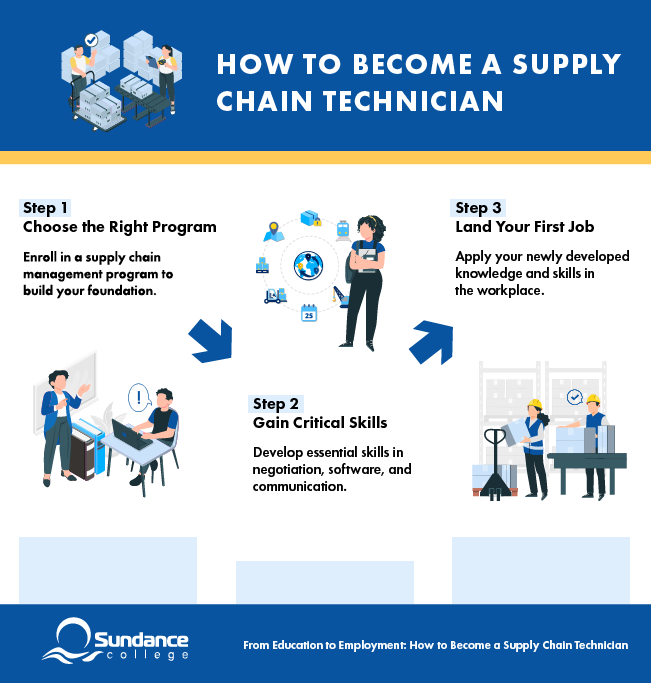Blog / How to Become a Supply Chain Technician
How to Become a Supply Chain Technician

Supply Chain Management Professional Diploma
- Supply Chain Management
- Shipping Coordinator
- Purchasing Agent
- Warehouse Supervisor
Table of Contents
When you visit your local retail store or place an online order, you’ll notice how products are often available when you need them. Even when stock runs low, it’s quickly replenished. While retail associates handle physical stocking, the job of getting those items to the store or distribution center on time often falls to supply technicians.
These professionals are employed in manufacturing facilities, distribution centers, and retail management outlets, where they manage product inventory, coordinate deliveries with suppliers and retailers, and maintain accurate records. By strategically preventing shortages and disruptions, they help maintain a reliable supply chain for companies to meet customer demands.
If you’re drawn to a role where no two days are the same and where your communication, organizational, and problem-solving skills make a difference in day-to-day business operations, here’s how to become a supply chain technician.
Listen to: How to Become a Supply Chain Technician
Step 1: Where to Begin: Educational Requirement for Supply Chain Technicians
While a high school diploma might have been enough in the past, today’s supply chain roles demand more expertise.
As supply chains grow more complex due to globalization, technological changes, and unexpected disruptions.
Employers in the supply chain field are increasingly looking for professionals with the right education, ensuring they have the skills to effectively navigate these challenges.
For those looking to enter the in-demand supply chain industry, earning a diploma provides the practical skills needed for essential tasks like logistics coordination, inventory management, procurement, and contract enforcement.
For individuals already working in entry-level supply chain roles, a diploma can help you advance by enhancing your skills and positioning you for growth and leadership opportunities within the industry.
Recognizing this need, Sundance College offers two diploma programs that provide the training to succeed in supply chain:
- The Supply Chain Management Technician (SCMT) diploma is a great option for those looking to get into the field quickly. This 32-week program covers the core skills needed to start a career in roles like Logistics Clerk or Inventory Coordinator.
- The Supply Chain Management Professional (SCMP) diploma is more in-depth, lasting 60 weeks. It’s ideal for those looking to go further within the supply chain industry and comes with accreditation through Supply Chain Canada, giving you a head start on earning the SCMP™ designation.
Both programs focus on practical skills directly tied to supply chain roles, offering in-depth knowledge of supply chain processes, contract law, inventory management, and sourcing strategies. These areas are critical for successfully managing supply chain operations, positioning you to contribute effectively to your organization.
Bright I., a Supply Chain Management student, reflected on the value of the Business Essentials course:
“The Business Essentials course in the program was insightful and provided a good foundation for global business and supply chain management.”
This foundational course equips students with the key concepts necessary to understand the complexities of modern supply chains, in today’s interconnected world.
Imagine you’re a shipping and receiving technician, responsible for managing incoming shipments and verifying deliveries. One day, a critical shipment arrives incomplete. You draw upon your supply chain management training and are able to quickly identify and solve the problem. By applying your knowledge of inventory control, you can reconcile records, and with your understanding of contract law, you may work with the supplier to resolve the discrepancy.
With a strong foundation in supply chain management, gained through the right diploma program, you’ll be ready to make informed decisions and successfully manage the demands of the field.
Step 2: Build Essential Supply Chain Skills

Success as a supply chain technician means going beyond just moving products from point A to point B. It requires a well-rounded skill set to ensure that every link in the chain functions without error. Here’s a look at the must-have skills that will set you apart:
Networking & Negotiation: Building strong relationships with suppliers and logistics partners is important, and negotiating better deals can have a direct impact on your operations.
Communication: Clear communication helps prevent delays and mistakes, keeping everyone on the same page and operations running effectively.
Operational Knowledge: Understanding inventory management, logistics, and procurement processes is necessary for maintaining an efficient supply chain.
Time Management: Prioritizing tasks and meeting deadlines directly influence customer satisfaction.
Tim Harrison leads the Career Services team at Sundance College. He highlights how these skills come together in supply chain logistics: “In supply chain, you need to communicate clearly with suppliers, plan for different transportation methods like trucks or trains, and keep timelines on track. Balancing all these elements helps prevent delays and keeps business operations going.”
Imagine you’re a logistics dispatcher based in Quebec. You’re responsible for coordinating shipments across the province. One particularly cold morning, you receive news that a delivery truck bound for a client in Montréal has broken down due to engine failure. Understanding the urgency, you tap into your network of local carriers, quickly securing a replacement truck despite the busy winter season. Negotiating a reasonable rate, you arrange for the new truck to take over the delivery, minimizing any delays.
Throughout the process, you maintain clear communication with the client and your team, providing timely updates on the adjusted delivery timeline. Your deep understanding of Quebec’s logistics challenges allows you to reroute the shipment efficiently, taking into account the challenging winter road conditions. Meanwhile, your strong time management skills help you handle this emergency while continuing to monitor other ongoing deliveries.
This combination of specialized skills allows you to address logistical issues promptly and maintain operational flow.
Step 3: Land Your First Job in Supply Chain Management
With your diploma in hand and the necessary skills in place, the next step is entering the job market. Supply chain professionals are needed across Canada, with opportunities available in every province. However, certain regions have emerged as particularly strong markets for specific roles, which can guide your job search if you’re aiming to maximize your prospects:
Supply Chain Assistant: This role is in demand across Canada, with particularly high demand in Manitoba’s Winnipeg and the Southeast region. Nova Scotia also presents numerous opportunities for supply chain support throughout the province.
Inventory Coordinator: Like other supply chain roles, inventory coordinators are essential for maintaining business operations across Canada. Ontario, especially in regions such as Ottawa, the Northeast, and the Hamilton-Niagara Peninsula, has a notable demand for this role due to its active transportation, warehousing, and retail sectors.
Logistics Dispatcher: While demand for logistics dispatchers is steady across Canada, Quebec’s Bas-Saint-Laurent and Monté Regie regions are particularly in need of skilled professionals, offering great opportunities for career growth.
Shipper and Receiver: Nationwide demand exists for these roles, with Manitoba and Nova Scotia standing out due to recent growth in their manufacturing sectors.
Supply chain roles are growing across Canada, with some regions showing significantly strong opportunities for those entering the field.

Ready To Become a Supply Chain Technician?
Sundance College’s supply chain management diploma programs are designed to take you through the steps you need to start or further your career in the supply chain. Through our training, not only will you have the opportunity to develop the essential hard and soft skills needed to succeed, you’ll also be able to gain experience and build a professional network as you go.
All our diploma programs include career services. Sundance College’s Career Services team provides personalized support to students and graduates. They offer assistance with job search strategies, resume building, interview preparation, and connecting students to potential employers. This lifetime support is designed to help students succeed both immediately after graduation and throughout their careers. The team is committed to helping graduates navigate the job market and achieve long-term career success.
If you opt to take our accredited Supply Chain Management Professional diploma, it includes a 7-week practicum in the supply chain industry to help you build the skills you need to be successful throughout the entire job seeking process and achieve gainful employment.
For more information on either of Sundance College’s Supply Chain Management Diploma programs, speak with an admission advisor to explore which program aligns with your personal career goals.
Related Blogs
Subscribe for more career advice
Blog Categories
Share on:
